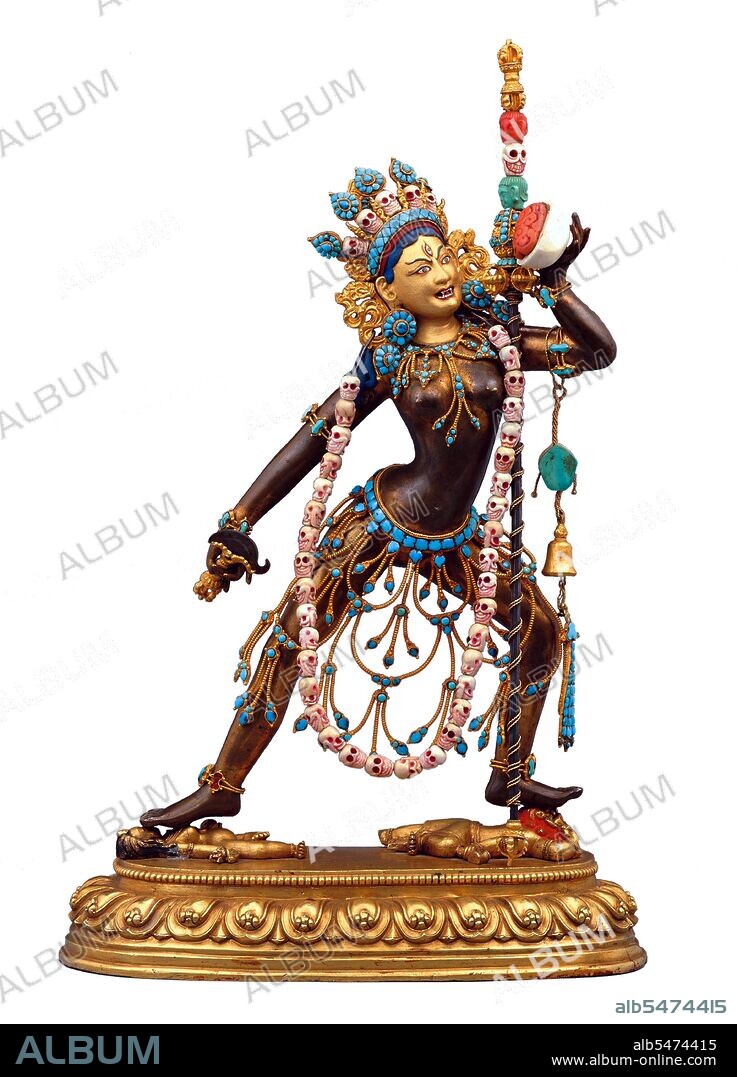alb5474415
China-Tibet: The dakini Nada Khechari, Norbulingka, Lhasa,17th-18th century

|
Ajouter à une autre Lightbox |
|
Ajouter à une autre Lightbox |



Avez-vous déjà un compte? S'identifier
Vous n'avez pas de compte ? S'inscrire
Acheter cette image

Titre:
China-Tibet: The dakini Nada Khechari, Norbulingka, Lhasa,17th-18th century
Légende:
Voir la traduction automatique
A dakini (Sanskrit: ?akini; Tibetan: khandroma) is a tantric deity described as a female embodiment of enlightened energy. In the Tibetan language, dakini is rendered khandroma which means 'she who traverses the sky' or 'she who moves in space'. Sometimes the term is translated poetically as 'sky dancer' or 'sky walker'. The dakini, in all her varied forms, is an important figure in Tibetan Buddhism. She is so central to the requirements for a practitioner to attain full enlightenment as a Buddha that she appears in a tantric formulation of the Buddhist Three Jewels refuge formula known as the Three Roots. Most commonly she appears as the protector, alongside a guru and yidam (enlightened being). Although dakini figures appear in Hinduism and in the Bön tradition, dakini are particularly prevalent in Vajrayana Buddhism and have been particularly conceived in Tibetan Buddhism where the dakini, generally of volatile or wrathful temperament, act somewhat as a muse for spiritual practice. Dakini are energetic beings in female form, evocative of the movement of energy in space. In this context, the sky or space indicates shunyata, the insubstantiality of all phenomena, which is, at the same time, the pure potentiality for all possible manifestations.
Crédit:
Album / Pictures From History/Universal Images Group
Autorisations:
Modèle: Non - Propriété: Non
Questions sur les droits?
Questions sur les droits?
Taille de l'image:
3550 x 4935 px | 50.1 MB
Taille d'impression:
30.1 x 41.8 cm | 11.8 x 16.4 in (300 dpi)
Mots clés:
ART (CATÉGORIE) • ART • ASIE • ASIE, CONTINENT • BAL • BOUDDHISME • BOUDDHISTE • BOUDDIQUE • BUDA • CHINE • CHINOIS • CHINOISE • CONTINENT ASIE • DAKINI • DANCEUR • DANSE • DANSEUR • DANSEUSE • FEMELLE • FEMM • FEMME • HISOIRE • HISTOIRE • RELIGION • RELIGION: BOUDDHISME • STATUE • STATUT • TIBET • TIBÉTAIN
 Pinterest
Pinterest Twitter
Twitter Facebook
Facebook Copier le lien
Copier le lien Email
Email
